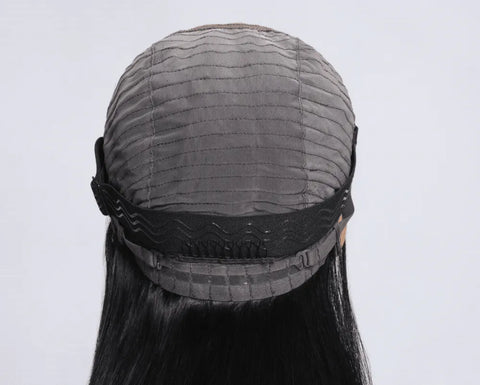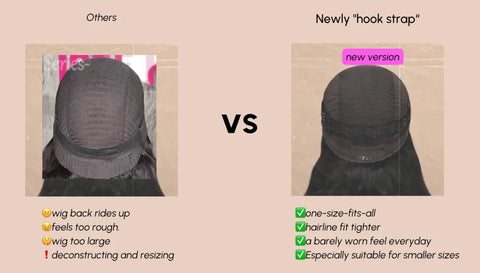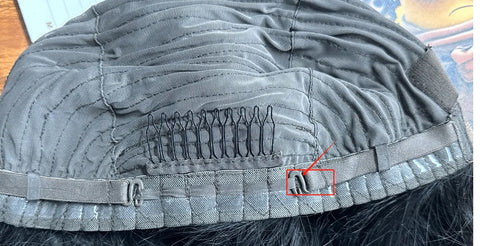Have you ever encountered such a problem when wearing a wig? With a new wig bought online, it was too large to completely fit your head shape or completely cover your ears, which looks funny. But please don't get angry. It's an easy problem to solve. Whether you wear a first-time wig or are an experienced professional, making a wig smaller is a skill you can master without spending too much time.

Option One: Adjust The Wig Cap - Choose Sunber Small Cap Wigs
While you are still concerned about how to modify your oversized wig cap, Sunber has developed a new product that can conveniently adjust the cap size - the small cap wig, and it will be available on the website soon. We improved on the existing wig cap and added 8 adjustable slots on the built-in hook straps for a secure, support-free fit.

The improved wig cap instantly tightens the entire head circumference for ultimate comfort, especially for smaller sizes.
What's The Difference Between Original Wig Cap and Newly Technology Small Cap Wigs?

They both fit women with normal head sizes and offer comfort in terms of texture.
For women with small head circumferences, the back of the original wig will appear very rough, and the overall wig will tilt up and not fit properly.

The new technology small cap wigs have 8 adjustable slots with built-in hook straps that allow the wig to be adjusted in size from xs to xl. The hairline fits tighter and will not lift up. One wig size fits all!
Option Two: How to make a wig smaller?
1. Measure your head circumference and assess the appropriateness of the wig.
Before making any modifications to the wig, it is crucial to assess its current fit. Put the wig on and evaluate if it is too large overall or if it is loose in specific areas such as the perimeter, crown, or sides. Identifying the areas that require adjustment will help you focus your efforts and achieve the desired fit more effectively.

2. Using Wig Clips and adjusting the wig cap
The easiest way to make a wig smaller is with hairpins, which can help you narrow the circumference and provide a safe grip. For the area that needs reinforcement, use the corresponding glue and clip to tighten. For example, around the cap, the back of the neck, or the ear.

What's more, most wigs are designed with a wig cap to make it easier for buyers to wear. The cap will be easier to adjust, with a lot of adjustable bands distributed inside.
Step 1: Begin by turning your wig inside out. The straps should be located either on both the right and left sides of the wig cap or at the back towards the nape.
Step 2: Adjust each band individually. Hold the band towards the center and pull the loose end to make it tighter.
Step 3: Repeat on the other side. These bands can be extended or shortened according to your needs. Tighten these bands and shrink the wig size.
If a wig you buy does not have these adjustment bands, you can measure your head circumference and detect a rubber strip that matches your head circumference. Then use the glue suture along the inside of the wig. An even distribution makes you more comfortable to wear.
3. Tailoring the wig makes it right for you
If your wig still doesn’t feel right after using the adjustment straps, it is time to break out the scissors, needle, and thread. You can always remove more wefts if you feel like you still are unhappy with the size of your wig.
Step 1: Before starting trimming, you need to prepare a pair of scissors, a needle, and threads close to the color of your wig.
Step 2: Start by pinning or clipping the excess wig hair away to make it more manageable. Carefully measure the wig against your head, identifying the areas where it needs to be trimmed.
Step 3: Carefully cut each yarn from the top. Then check it again to see if they are still attached to the wig cap. If there are connection points, you need to cut the connection points they have on the wig and remove the veil cut from the wig. Push the hair back in place and align each latitude yarn to organize the wig.

Tips: When you use scissors to trim the excess wig material, you must be careful, take your time, cut a small part at a time, try to wear the effect after pruning many times, prevent one-time pruning too much, cause irreversible damage to the wig. This process may involve you with even more patience.
Step 4: It’s time to sew everything back together. Begin sewing at the top from either the left side or the right side of the wig. Be sure to tie a knot so your thread does not slip out.
Step 5: Continue sewing across the wig. Remember to sew once in the middle of wefts and twice on thick bands. Always tie a knot on the bands. Finish off your newly sewn wig with a double knot at the end for extra security. Repeat the sewing process until you’ve sewn the final elastic strip to the crown.
Well, you're done. While the process may seem complicated, it's an easy way to make your wig smaller. Have a try! If you're afraid of cutting your new wig, you can practice with an old wig first.
4. Sew it directly

If you think the above method is more troublesome, you can try the tailoring method. But this method is not as natural as the above method, but it is simple and easy to operate.
Step1:After turning your wig inside out, locate the area you want to make smaller. Then, bring two wefts together along the elastic strap by making a tuck or fold.
Step2:Make two or three stitches through the strap and tie them off with a knot to hold the tuck together.
Step3:Repeat steps 1 and 2. Any stitches you make can be easily removed if you make a mistake or make too many tucks. Try the wig on regularly to check the progress and ensure you’re altering the right area.
Conclusion:
A properly sized wig is the key to whether we use it naturally. If you happen to have this problem, hopefully, our blog can help you. Of course, if you find the above method a hassle, you can measure your head circumference before buying a wig and buy small cap wigs.









